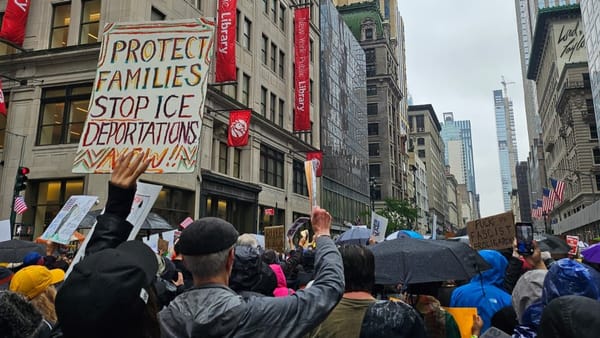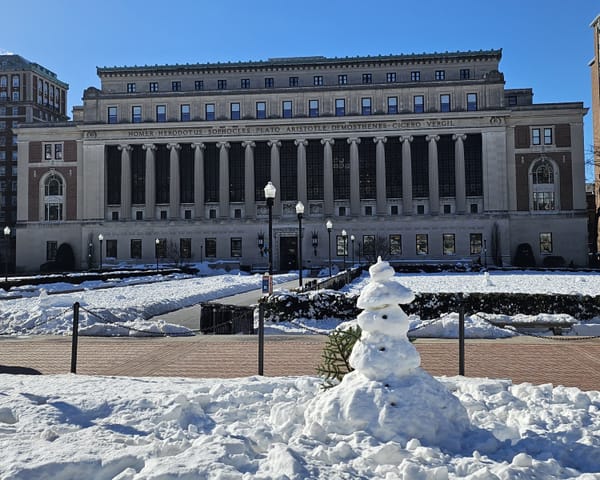11.17 | pr for plastic is fantastic (& that's horrifying)
Who’s going to remember that the Number 2 means “high density polyethylene,” which recycling centers accept, while the Number 6 means “polystyrene,” which is mostly a no go? Why put a recycle symbol when something’s basically unrecyclable?

If the devil is the ultimate deceiver, then words must be the very devil.
– Marty Rubin
✉️ letter #1
If you’re in the USA, you’ve probably seen these signs on various types of plastics material and been surprised to find out that, despite it being the universally recognized symbol for recycling, the number within it was actually what you were supposed to be paying attention to.
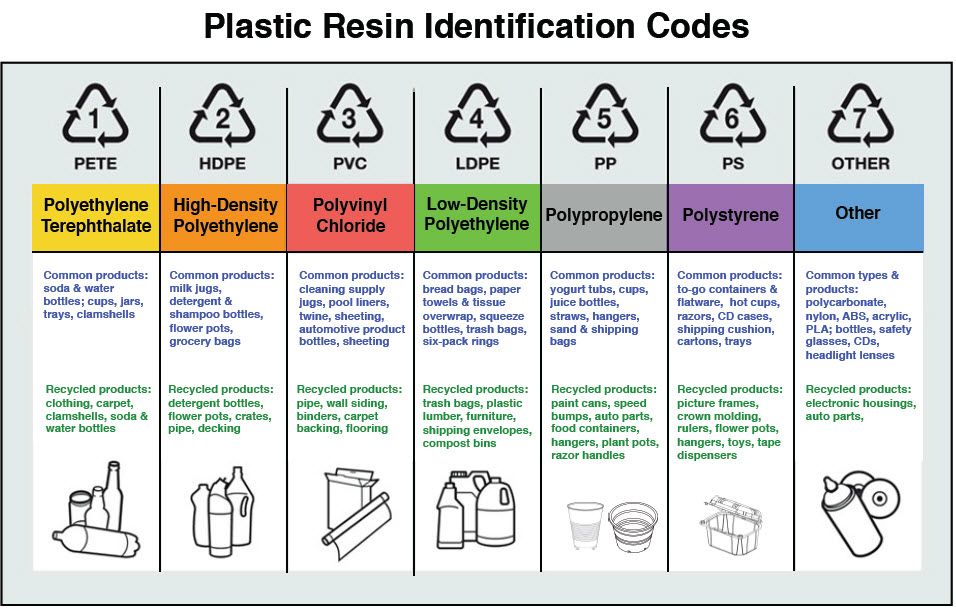
That doesn’t make sense right? Who’s going to remember that the Number 2 means “high density polyethylene,” which recycling centers accept, while the Number 6 means “polystyrene,” which is mostly a no go? Why put a recycle symbol when something’s basically unrecyclable?
Turns out that was a deliberate move by the plastics industry, which had already determined about 50 years ago that the vast majority of its goods were going to pile up somewhere as useless junk and that consumers were already getting pissed off about it. I learned about it listening to a backlog of Planet Money episodes from last year and I. am. shook. that this is not more common knowledge.
Basically, instead of making a more recyclable product (which would have taken way more resources and lost them some of the cost effectiveness current plastics have), the plastics industry got together, hired a great marketer and enacted a PR campaign that painted plastics as a resource that could “turn into” new things on the regular. They had a bunch of photo op events where they helped “put recycling on the agenda” of various elementary schools and communities - at least until the cameras turned off. And they came up with this number-within-a-recycling-symbol system, which relies on you to look at the fine print to understand what it means.
And as the goodwill built up, people became less fussed about where all those bottles, ticks and tacks, endless reams of packaging etc. would end up.
Which helped put us on the road to the world we’re in today - where even babies have micro plastics in their intestines.
Greenwashing at its finest. Tell me that's doesn't upset you.
It's stuck with me a lot this week as I continue to try and parse what happened at COP26 last week. Where world leaders with the actual power to lead us out of this climate mess came up with an agreement that was alarmingly milquetoast.
Indigenous communities have called the agreements that have come about this global meeting "a death sentence" - the carbon trading scheme they envision basically gives corporations massive incentives to raze over native lands to create "green energy" projects.
Scientists, who have to work closer to politicians, seem to have tried as desperately as I had to find an upside. There isn't much of one though - they warned that even the unambitious goal of fulfilling what was agreed to five years ago was already not enough - we're already pretty screwed at 1.1C+ a temperature change, but our limit right now is set at 1.5C.
When I tried to come up with any action that us plebs could do to combat climate change in my COP26 primer, I dedicated a lot of words to warning about being a green living morality nag.
I still stand by that statement - attacking individuals (and yourself) for not following the righteous path of environmental action is destructive both to the movement and to your personal relationships.
But I want to emphasize that there are things you should attack:
- Politicians who will utilize the words "job scarcity" and "energy crisis" to stonewall actions against climate change mitigation. While I don't believe we should run willy nilly towards any environmental buzzword, I think you can tell who these people are by how much they are saying things like "the industry can regulate themselves" and "I just want to caution against going too fast."
- Any attempt by a company to PR their way to "greenness" with any type of recycling/sequestration technology that will let you continue your old consumption patterns guilt-free - oil conglomerates excited about carbon capture, clothing companies who promote fabric recycling, any group involved in getting you to continue using plastics. In fact, if anything promotes the status quo (but is somehow better), it's probably too good to be true. Let me tell you about what the hell is going on with vaping one day.
And continue to learn as much as you can about the systems that move the world around. The more you know about how recycling actually works, or how carbon actually can be sequestered, or how solar panels and batteries are made, the more you can figure out which system you can devote your energies to trying to change.
At least, I'm going to continue telling myself that, because blah. What else can we even do at this point?
🌱 the ethical ideas newsreel
- One piece of legitimately good news from COP26 though was that the USA and China both agreed to boost climate cooperation with each other. Not only are they two the biggest carbon emitters in the world, the more cooperation between them, the less likelihood for war. So like, fingers crossed.
- Another caveat that I'm not saying you shouldn't be on the lookout for the next breakthrough too. I'm not super optimistic about us finding something that will absolve our polluting asses quick enough to combat climate change, but it would be cool if this scientific method for making jet fuel from sunlight and air was in fact feasible.
- Something for me to think about as I read through it more thoroughly: "How to put sustainability at the heart of your career" by Morag Wilson, the Director of Natural Change.
- Oh, something else to worry about, I guess: Artificial Intelligence. AI researcher Timnit Gebru, who got kicked out of Google, is asking us all to slow down on creating all these algorithms until we can figure out what harm we're doing with them.
- Ugh! I hate ending on a bad note! So here's something sweet about a community finding itself and each other through technology - Chinese indie gamers on Steam. I love Chaoyang Traphouse and its amazing newsletter on esoteric cultural moments! You probably will too!
🎵 song of my week
I guess 15 newsletters in and I should probably address the fact that the Spotify preview doesn't actually appear in people's emails. So all you few people who only read this by email have probably been wondering why I just tell you about a song and then don't... like, give a link to it or anything.
Check it out on the web version and I swear there's something for you to click on and listen to! In the meantime, I guess I'll try to look these songs up on Youtube as well so that at least on email, an image shows up somewhere here.
Today's song just feels like it's right for this moment. It's funky, it's fun, and it's got lyrics like, "We broke... But we woke" and a giant agitated scream in the middle to solidify the chorus. I feel you, song. I feel you.
✨enjoying: one final piece of pop culture fun
I got to spend a decent amount of time alone this weekend, just wandering and going into restaurants to eat by my lonesome, which meant: prime reading time! So this week’s featured pop culture bit is a book. Hardtack and Coffee, by John Billings.
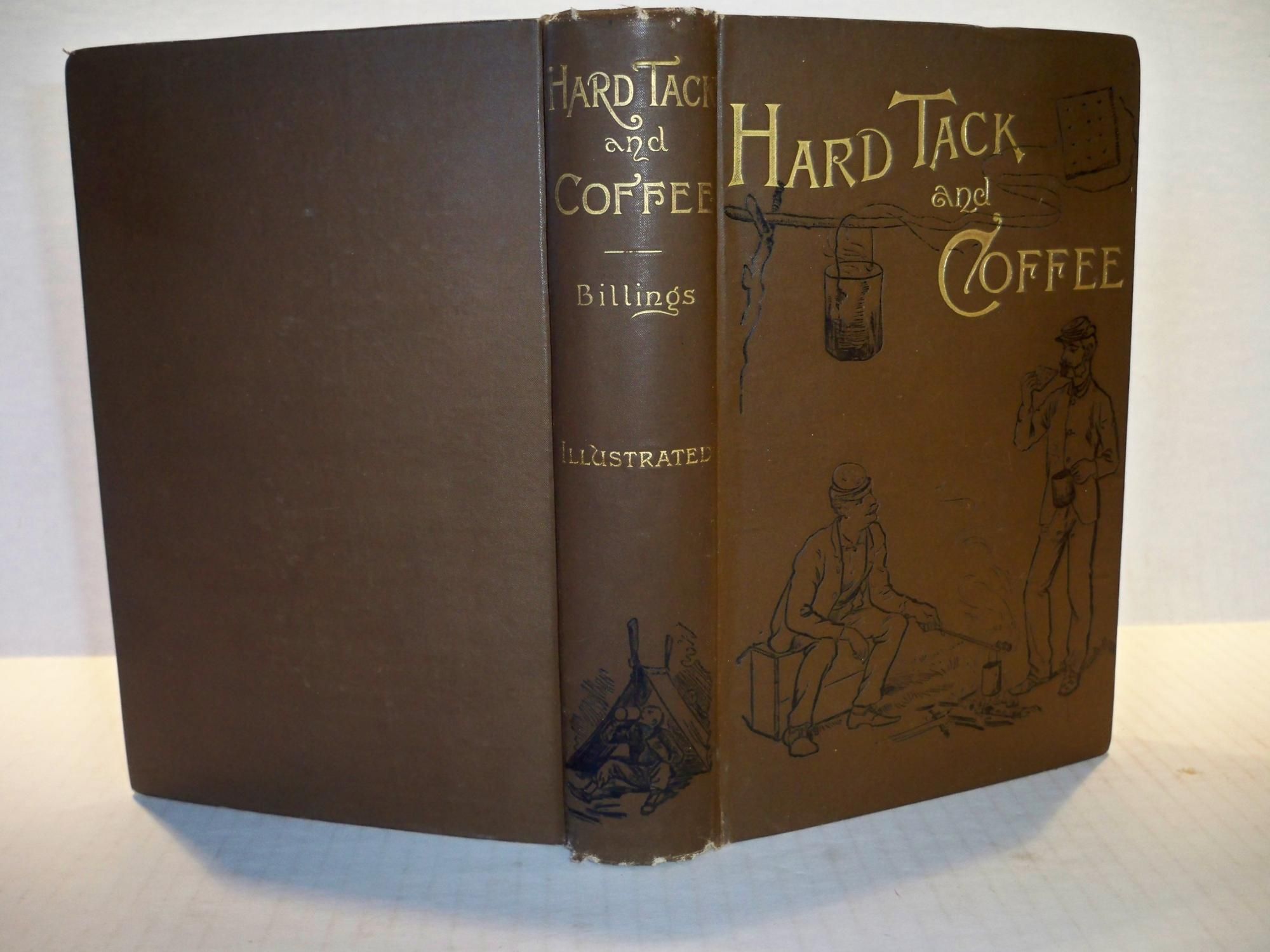
Written just after the Civil War, it’s a full account of what a soldier’s life was like by an actual soldier in the Union army. And since it’s written in the style of its time, it’s hard not to read it with a bit of a twang and a Ken Burns soundtrack running through your head.
Full disclosure, I have not finished this book yet. Some parts that are less interesting to me - a very detailed description of sleeping quarters, for instance - were kind of hard to slog through.
But I was lucky that the start of the chapter I had made it to this weekend was one about food, and finding out about soldiers rations was absolutely fascinating. Soldiers in the early 19th century rarely ate well, it seems.
The name of the book comes from the name of the storage-safe dried bread that made up most of a soldier’s ration, and what they dunked it into to make it actually chewable. Sometimes the bread would be infested with weevils, and that wouldn’t be enough to consider it unfit for human consumption.

They had a meat ration, but from the descriptions of the “salted” versions, it was more saltpeter than protein. It sounds horrific on here, but it’s written in such a jolly joshing way that I was as riveted as if they were talking about good food.
Also, I present to you this ode to beans, which apparently were the most delicious dish a company of soldiers could scrap together:
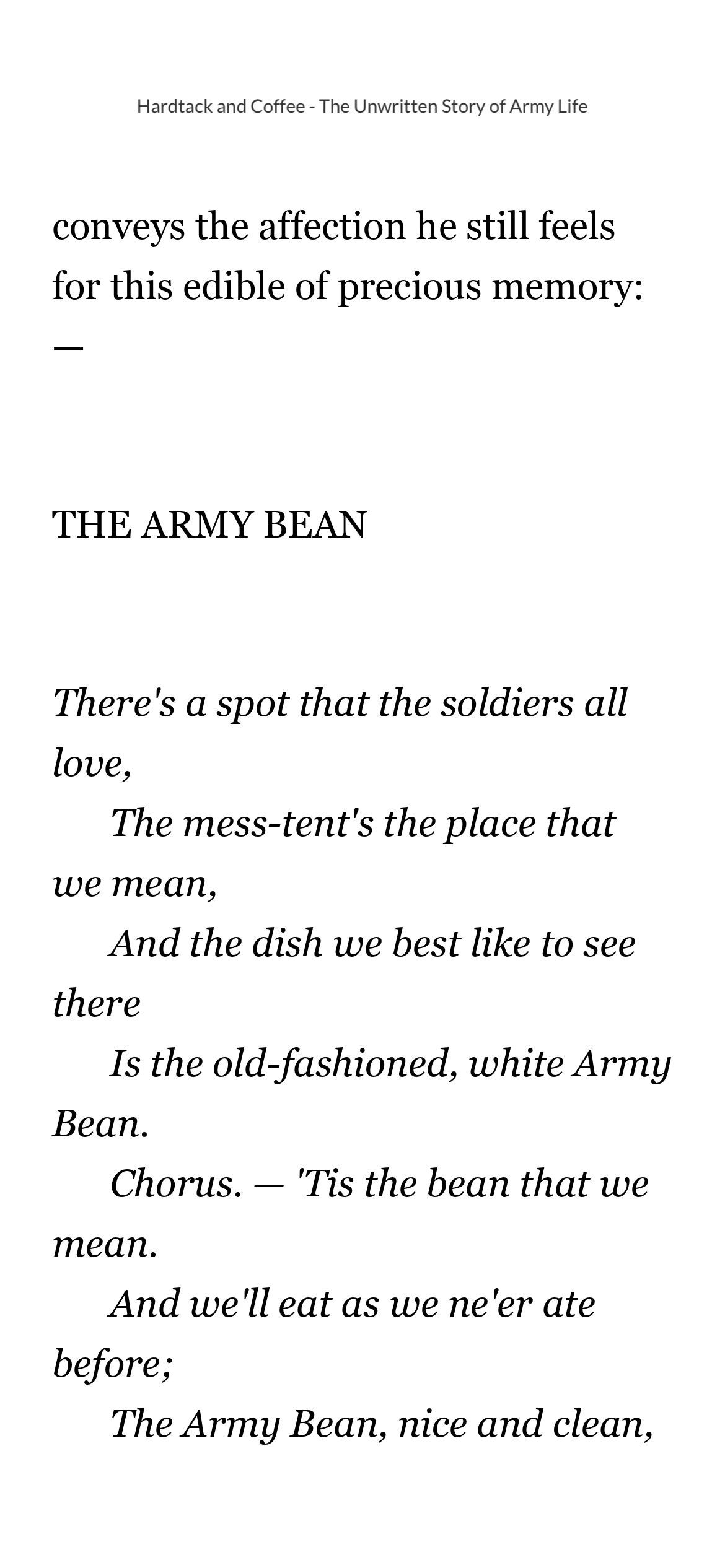
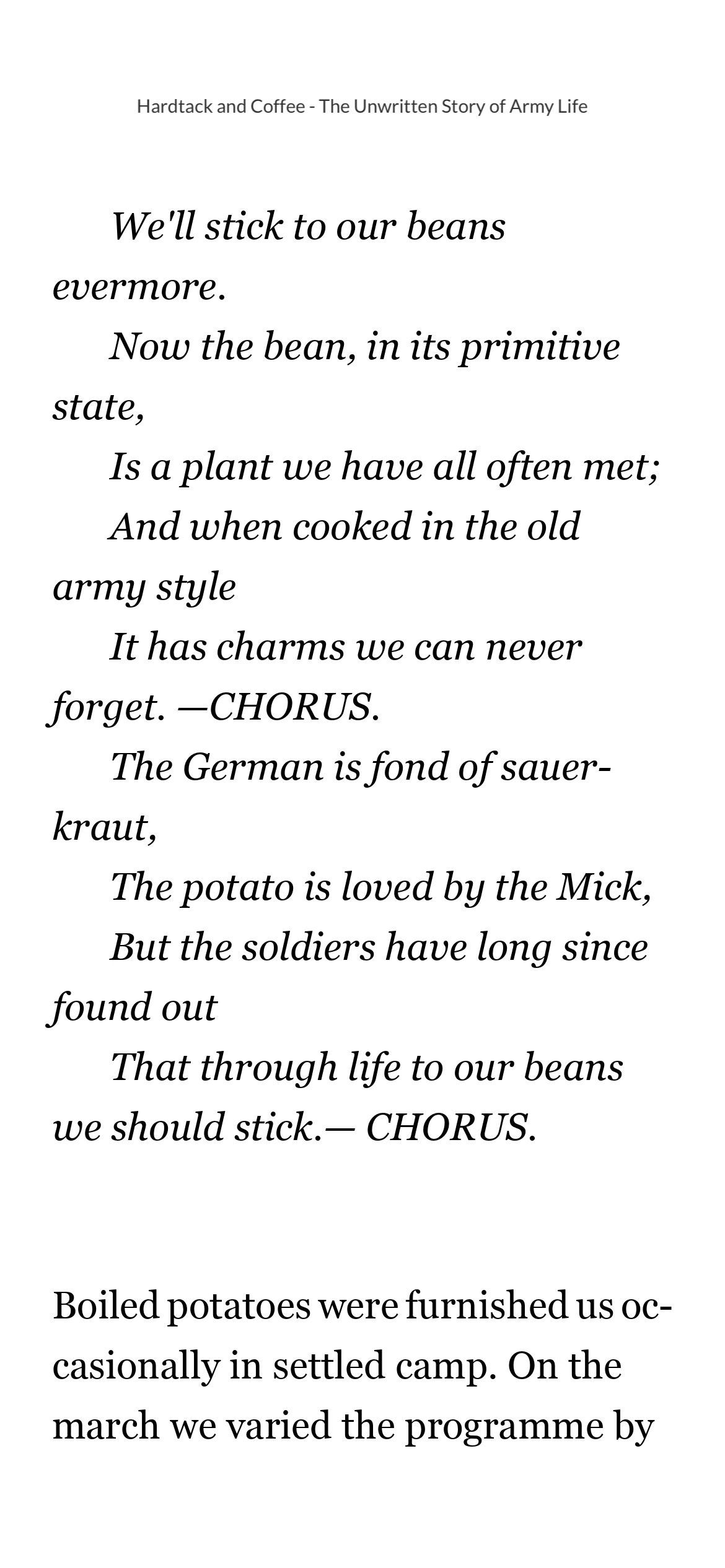
I believe I came across this book because it was on Nook’s free list, having had its copyrights pass a long time ago. Even if I don’t finish it for another year or so (the next chapter is about punishments, and I can see that grueling enough for me to put on the back burner for another long while), I recommend getting it for this food chapter alone!
Did you enjoy it?
Stalk me on Social Media


